- Home
- George MacDonald
A Double Story
A Double Story Read online
Produced by Charles Aldarondo. HTML version by Al Haines.
A DOUBLE STORY
BY GEORGE MACDONALD.
NEW YORK:
A DOUBLE STORY
I.
There was a certain country where things used to go rather oddly. Forinstance, you could never tell whether it was going to rain or hail, orwhether or not the milk was going to turn sour. It was impossible tosay whether the next baby would be a boy, or a girl, or even, after hewas a week old, whether he would wake sweet-tempered or cross.
In strict accordance with the peculiar nature of this country ofuncertainties, it came to pass one day, that in the midst of a showerof rain that might well be called golden, seeing the sun, shining as itfell, turned all its drops into molten topazes, and every drop was goodfor a grain of golden corn, or a yellow cowslip, or a buttercup, or adandelion at least;--while this splendid rain was falling, I say, witha musical patter upon the great leaves of the horse-chestnuts, whichhung like Vandyke collars about the necks of the creamy, red-spottedblossoms, and on the leaves of the sycamores, looking as if they hadblood in their veins, and on a multitude of flowers, of which somestood up and boldly held out their cups to catch their share, whileothers cowered down, laughing, under the soft patting blows of theheavy warm drops;--while this lovely rain was washing all the air cleanfrom the motes, and the bad odors, and the poison-seeds that hadescaped from their prisons during the long drought;--while it fell,splashing and sparkling, with a hum, and a rush, and a softclashing--but stop! I am stealing, I find, and not that only, but withclumsy hands spoiling what I steal:--
"O Rain! with your dull twofold sound, The clash hard by, and the murmur all round:"
--there! take it, Mr. Coleridge;--while, as I was saying, the lovelylittle rivers whose fountains are the clouds, and which cut their ownchannels through the air, and make sweet noises rubbing against theirbanks as they hurry down and down, until at length they are pulled upon a sudden, with a musical plash, in the very heart of an odorousflower, that first gasps and then sighs up a blissful scent, or on thebald head of a stone that never says, Thank you;--while the very sheepfelt it blessing them, though it could never reach their skins throughthe depth of their long wool, and the veriest hedgehog--I mean the onewith the longest spikes--came and spiked himself out to impale as manyof the drops as he could;--while the rain was thus falling, and theleaves, and the flowers, and the sheep, and the cattle, and thehedgehog, were all busily receiving the golden rain, somethinghappened. It was not a great battle, nor an earthquake, nor acoronation, but something more important than all those put together. ABABY-GIRL WAS BORN; and her father was a king; and her mother was aqueen; and her uncles and aunts were princes and princesses; and herfirst-cousins were dukes and duchesses; and not one of hersecond-cousins was less than a marquis or marchioness, or of theirthird-cousins less than an earl or countess: and below a countess theydid not care to count. So the little girl was Somebody; and yet for allthat, strange to say, the first thing she did was to cry. I told you itwas a strange country.
As she grew up, everybody about her did his best to convince her thatshe was Somebody; and the girl herself was so easily persuaded of itthat she quite forgot that anybody had ever told her so, and took itfor a fundamental, innate, primary, first-born, self-evident,necessary, and incontrovertible idea and principle that SHE WASSOMEBODY. And far be it from me to deny it. I will even go so far as toassert that in this odd country there was a huge number of Somebodies.Indeed, it was one of its oddities that every boy and girl in it, wasrather too ready to think he or she was Somebody; and the worst of itwas that the princess never thought of there being more than oneSomebody--and that was herself.
Far away to the north in the same country, on the side of a bleak hill,where a horse-chestnut or a sycamore was never seen, where were nomeadows rich with buttercups, only steep, rough, breezy slopes, coveredwith dry prickly furze and its flowers of red gold, or moister, softerbroom with its flowers of yellow gold, and great sweeps of purpleheather, mixed with bilberries, and crowberries, and cranberries--no, Iam all wrong: there was nothing out yet but a few furze-blossoms; therest were all waiting behind their doors till they were called; and nofull, slow-gliding river with meadow-sweet along its oozy banks, only alittle brook here and there, that dashed past without a moment to say,"How do you do?"--there (would you believe it?) while the same cloudthat was dropping down golden rain all about the queen's new baby wasdashing huge fierce handfuls of hail upon the hills, with such forcethat they flew spinning off the rocks and stones, went burrowing in thesheep's wool, stung the cheeks and chin of the shepherd with theirsharp spiteful little blows, and made his dog wink and whine as theybounded off his hard wise head, and long sagacious nose; only, whenthey dropped plump down the chimney, and fell hissing in the littlefire, they caught it then, for the clever little fire soon sent them upthe chimney again, a good deal swollen, and harmless enough for awhile, there (what do you think?) among the hailstones, and theheather, and the cold mountain air, another little girl was born, whomthe shepherd her father, and the shepherdess her mother, and a goodmany of her kindred too, thought Somebody. She had not an uncle or anaunt that was less than a shepherd or dairymaid, not a cousin, that wasless than a farm-laborer, not a second-cousin that was less than agrocer, and they did not count farther. And yet (would you believe it?)she too cried the very first thing. It WAS an odd country! And, what isstill more surprising, the shepherd and shepherdess and the dairymaidsand the laborers were not a bit wiser than the king and the queen andthe dukes and the marquises and the earls; for they too, one and all,so constantly taught the little woman that she was Somebody, that shealso forgot that there were a great many more Somebodies besidesherself in the world.
It was, indeed, a peculiar country, very different from ours--sodifferent, that my reader must not be too much surprised when I add theamazing fact, that most of its inhabitants, instead of enjoying thethings they had, were always wanting the things they had not, ofteneven the things it was least likely they ever could have. The grown menand women being like this, there is no reason to be further astonishedthat the Princess Rosamond--the name her parents gave her because itmeans Rose of the World--should grow up like them, wanting every thingshe could and every thing she couldn't have. The things she could havewere a great many too many, for her foolish parents always gave herwhat they could; but still there remained a few things they couldn'tgive her, for they were only a common king and queen. They could anddid give her a lighted candle when she cried for it, and managed bymuch care that she should not burn her fingers or set her frock onfire; but when she cried for the moon, that they could not give her.They did the worst thing possible, instead, however; for they pretendedto do what they could not. They got her a thin disc of brilliantlypolished silver, as near the size of the moon as they could agree upon;and, for a time she was delighted.
But, unfortunately, one evening she made the discovery that her moonwas a little peculiar, inasmuch as she could not shine in the dark. Hernurse happened to snuff out the candles as she was playing with it; andinstantly came a shriek of rage, for her moon had vanished. Presently,through the opening of the curtains, she caught sight of the real moon,far away in the sky, and shining quite calmly, as if she had been thereall the time; and her rage increased to such a degree that if it hadnot passed off in a fit, I do not know what might have come of it.
As she grew up it was still the same, with this difference, that notonly must she have every thing, but she got tired of every thing almostas soon as she had it. There was an accumulation of things in hernursery and schoolroom and bedroom that was perfectly appalling. Hermother's wardrobes were almost useless to her, so packed were they withthings of which she never took any notice. When she
was five years old,they gave her a splendid gold repeater, so close set with diamonds andrubies, that the back was just one crust of gems. In one of her littletempers, as they called her hideously ugly rages, she dashed it againstthe back of the chimney, after which it never gave a single tick; andsome of the diamonds went to the ash-pit. As she grew older still, shebecame fond of animals, not in a way that brought them much pleasure,or herself much satisfaction. When angry, she would beat them, and tryto pull them to pieces, and as soon as she became a little used tothem, would neglect them altogether. Then, if they could, they wouldrun away, and she was furious. Some white mice, which she had ceasedfeeding altogether, did so; and soon the palace was swarming with whitemice. Their red eyes might be seen glowing, and their white skinsgleaming, in every dark corner; but when it came to the king's findinga nest of them in his second-best crown, he was angry and ordered themto be drowned. The princess heard of it, however, and raised such aclamor, that there they were left until they should run away ofthemselves; and the poor king had to wear his best crown every day tillthen. Nothing that was the princess's property, whether she cared forit or not, was to be meddled with.
Of course, as she grew, she grew worse; for she never tried to growbetter. She became more and more peevish and fretful everyday--dissatisfied not only with what she had, but with all that wasaround her, and constantly wishing things in general to be different.She found fault with every thing and everybody, and all that happened,and grew more and more disagreeable to every one who had to do withher. At last, when she had nearly killed her nurse, and had all butsucceeded in hanging herself, and was miserable from morning to night,her parents thought it time to do something.
A long way from the palace, in the heart of a deep wood of pine-trees,lived a wise woman. In some countries she would have been called awitch; but that would have been a mistake, for she never did any thingwicked, and had more power than any witch could have. As her fame wasspread through all the country, the king heard of her; and, thinkingshe might perhaps be able to suggest something, sent for her. In thedead of the night, lest the princess should know it, the king'smessenger brought into the palace a tall woman, muffled from head tofoot in a cloak of black cloth. In the presence of both theirMajesties, the king, to do her honor, requested her to sit; but shedeclined, and stood waiting to hear what they had to say. Nor had sheto wait long, for almost instantly they began to tell her the dreadfultrouble they were in with their only child; first the king talking,then the queen interposing with some yet more dreadful fact, and attimes both letting out a torrent of words together, so anxious werethey to show the wise woman that their perplexity was real, and theirdaughter a very terrible one. For a long while there appeared no signof approaching pause. But the wise woman stood patiently folded in herblack cloak, and listened without word or motion. At length silencefell; for they had talked themselves tired, and could not think of anything more to add to the list of their child's enormities.
After a minute, the wise woman unfolded her arms; and her cloakdropping open in front, disclosed a garment made of a strange stuff,which an old poet who knew her well has thus described:--
"All lilly white, withoutten spot or pride, That seemd like silke and silver woven neare; But neither silke nor silver therein did appeare."
"How very badly you have treated her!" said the wise woman. "Poorchild!"
"Treated her badly?" gasped the king.
"She is a very wicked child," said the queen; and both glared withindignation.
"Yes, indeed!" returned the wise woman. "She is very naughty indeed,and that she must be made to feel; but it is half your fault too."
"What!" stammered the king. "Haven't we given her every mortal thingshe wanted?"
"Surely," said the wise woman: "what else could have all but killedher? You should have given her a few things of the other sort. But youare far too dull to understand me."
"You are very polite," remarked the king, with royal sarcasm on histhin, straight lips.
The wise woman made no answer beyond a deep sigh; and the king andqueen sat silent also in their anger, glaring at the wise woman. Thesilence lasted again for a minute, and then the wise woman folded hercloak around her, and her shining garment vanished like the moon when agreat cloud comes over her. Yet another minute passed and the silenceendured, for the smouldering wrath of the king and queen choked thechannels of their speech. Then the wise woman turned her back on them,and so stood. At this, the rage of the king broke forth; and he criedto the queen, stammering in his fierceness,--
"How should such an old hag as that teach Rosamond good manners? Sheknows nothing of them herself! Look how she stands!--actually with herback to us."
At the word the wise woman walked from the room. The great foldingdoors fell to behind her; and the same moment the king and queen werequarrelling like apes as to which of them was to blame for herdeparture. Before their altercation was over, for it lasted till theearly morning, in rushed Rosamond, clutching in her hand a poor littlewhite rabbit, of which she was very fond, and from which, only becauseit would not come to her when she called it, she was pulling handfulsof fur in the attempt to tear the squealing, pink-eared, red-eyed thingto pieces.
"Rosa, RosaMOND!" cried the queen; whereupon Rosamond threw the rabbitin her mother's face. The king started up in a fury, and ran to seizeher. She darted shrieking from the room. The king rushed after her;but, to his amazement, she was nowhere to be seen: the huge hall wasempty.--No: just outside the door, close to the threshold, with herback to it, sat the figure of the wise woman, muffled in her darkcloak, with her head bowed over her knees. As the king stood looking ather, she rose slowly, crossed the hall, and walked away down the marblestaircase. The king called to her; but she never turned her head, orgave the least sign that she heard him. So quietly did she pass downthe wide marble stair, that the king was all but persuaded he had seenonly a shadow gliding across the white steps.
For the princess, she was nowhere to be found. The queen went intohysterics; and the rabbit ran away. The king sent out messengers inevery direction, but in vain.
In a short time the palace was quiet--as quiet as it used to be beforethe princess was born. The king and queen cried a little now and then,for the hearts of parents were in that country strangely fashioned; andyet I am afraid the first movement of those very hearts would have beena jump of terror if the ears above them had heard the voice of Rosamondin one of the corridors. As for the rest of the household, they couldnot have made up a single tear amongst them. They thought, whatever itmight be for the princess, it was, for every one else, the best thingthat could have happened; and as to what had become of her, if theirheads were puzzled, their hearts took no interest in the question. Thelord-chancellor alone had an idea about it, but he was far too wise toutter it.

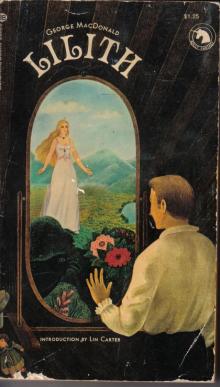 Lilith: A Romance
Lilith: A Romance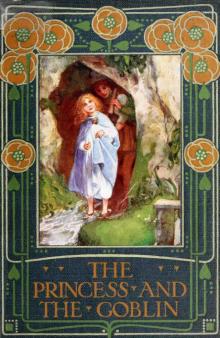 The Princess and the Goblin
The Princess and the Goblin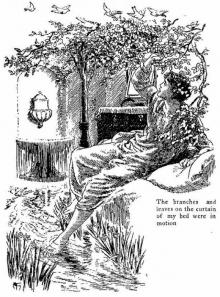 Phantastes: A Faerie Romance for Men and Women
Phantastes: A Faerie Romance for Men and Women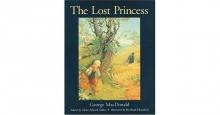 A Double Story
A Double Story St. George and St. Michael
St. George and St. Michael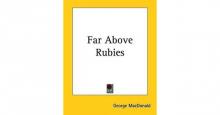 Far Above Rubies
Far Above Rubies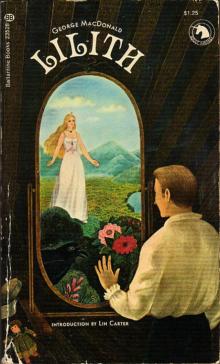 Lilith
Lilith